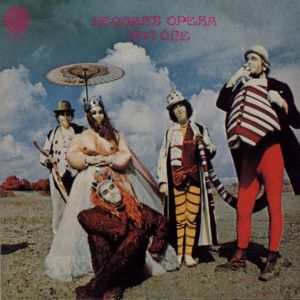
- Format: MP3

Japan 24-Bit Remaster
Beggars Opera were one of the best groups of the early British symphonic style, characterized by the likes of Spring, Fantasy and Cressida. Whereas some of their peers had a tendency to be overly concerned with pop melodies at the expense of instrumental depth, Beggars Opera were able to successfully meld the two, thanks in large part of Alan Park's distinctive organ and keyboard, as well as Rick Gardiner's biting guitar. As part of the legendary Vertigo label, the first incarnation produced a number of solid albums, and at least one true classic in 1971's Waters of Change. Lacking commercial interest, they broke up after the disappointing Get Your Dog Off Me!. Gardiner and keyboardist Virginia Scott continued with the Beggar's Opera name and released a further two albums, Sagittary and Beggars Can't Be Choosers on the German label, Jupiter. The Beggars Opera name was revived again in the late 70s by Gordon Sellar for an album entitled Lifeline. Apparently these later albums have little to do with the original vision of the band, and it's best to stick with one of the first three releases.
Beggar’s Opera’s first album has, with the passage of time, gradually gained belated (but justified) recognition as a truly superb piece of work. The band, which hails from my native homeland (and in fact played at my High school around the time this album was released!), hit the ground running in terms of originality and imagination.
“Act one” precedes the Mellotron driven symphonic prog which featured on its immediate successors (“Waters of change” and “Pathfinder”), but is nonetheless heavily influenced by the classics. Consisting of just five tracks, it needs to be remembered that this album was released in the same year as Pink Floyd were moving from psych into prog with “Atom heart Mother”, Genesis were only just getting beyond their Jonathan King phase with their first proper album "Trespass", and ELP had just come together and released their first album. With that in mind, it is difficult to explain why those albums have gained legendary status, while “Act one” is all but forgotten.
The album opens with “Poet and peasant”, which borrows heavily from Franz von Suppe’s overture of that name. The track features dominant Hammond organ, and the highly distinctive vocals of Martin Griffiths. The music has something of an early 70’s Italian prog feel to it. “Passacaglia” continues in a similar vein, with some Keith Emerson like (The Nice era) organ work, incessant time changes, and vocals through an old radio mike some 30 years before Arena used the same effect on “Contagion”. If you listen carefully, you can here the introductory theme to “Sarabande” within the track. “Sarabande” was an excellent non-album single released at the time, which is now included as a bonus track on the CD version. “Memory”, the final track on the first side of the LP is the shortest, and weakest track on the album, but it still features some nice lead guitar to close.
The second side consist of just two long tracks. “Raymond’s Road” is a lengthy instrumental collage of classical pieces played at breakneck speed. Hammond organ once again dominates the track, but the screaming lead guitars and galloping drums make the track reminiscent of Love Sculpture’s (Dave Edmunds) mesmerising interpretation of Katchaturian’s “Sabre dance”. While “Sabre dance” does not actually appear, other classical pieces which do include “Toccata”, “Peer gynt”, and “William Tell”. Tellingly, there’s also a brief rendition of “Karelia Suite” which sounds very similar to the Nice’s "Five bridges" interpretation. The album closes with another Suppe based piece, “Light cavalry”. This is similar in structure to the opening track, with vocals and classical variations.
While the band take full credit for the compositions throughout, no attempt is made to disguise the classic pieces which have been borrowed when making the album. Generally, they do not appear to be taking themselves as seriously as say ELP, giving the album a definite air of fun. Heard for the first time today, “Act one” will undoubtedly sound dated. Given it’s place in the timeline of prog however, it is a genuine landmark album, full of originality and fine musicianship. It might even be appropriate to classify the album as, dare I say, seminal.
A couple of interesting footnotes. The album was produced by Bill Martin and Phil Coulter who wrote many hits songs including Eurovision song contest winner “Puppet on a string” for Sandi Shaw, and runner up “Congratulations” for Sir Clifford of Richard (but don’t let that put you off!). It was originally release in 1970 on the Vertigo “swirl” label. First edition LPs in pristine condition with untarnished sleeves are now very collectable, and change hands for exorbitant prices. [Bob McBeath]
Ricky Gardiner - Guitar
Alan Park - Keyboards
Marshall Erskine - Bass, Flute
Martin Griffiths - Vocals
Raymond Wilson - Drums, Percussion